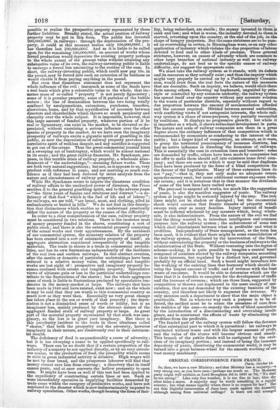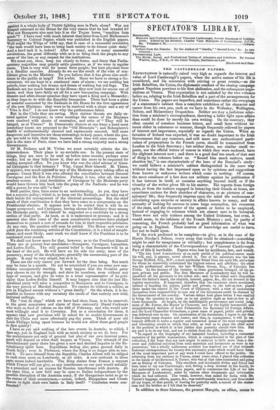ORIGINAL CORRESPONDENCE FROM FRANCE. Paris, October 19. So, then, we
have a new Ministry; and that Ministry has a majority,- very strong one, as you have seen—perhaps too ranch so. The Moderate party might well exclaim, as Lord Brougham did in 1831 or '32, "We shall be too strong!" Like very fine weather, it is too fine to last; blue sky often hides a storm. A majority may be worth something in a regular country; but what means legality where there is no respect for law? Has not that frightful insurrection of June been made against the Assembly although issuing from universal suffrage? Is there not still arranged against it a whole body of 70,000 fighting men in Paris alone? Was not Respell returned to the House for the very reason that he had invaded it? Was not Bonaparte also sent into it as the Trojan horse' "machine fceta armis"? I have read with much interest that letter from Lord Melbourne's Secretary to Colonel Napier, which was published in the English papers. Well might the Whigs of 1832 say, that in case of a successful revolution "the task would have been to bring back society to its former quiet state." And a hard task it is, indeed! After so many, and so many successful revolutions, the great difficulty with us is to bring back the people to any sense of the law, or any respect for the institutions.
We must not, then, keep too closely to forms, and fancy that Parlia- mentary majorities may quietly settle questions as if we were in regular times. That is very well for moral force people; but here physical force is a familiar exercise. Already do we see the result of the vote of con- fidence given to the Ministry. Do you believe that it has given also confi- dence to the public at large? Not a whit. Since we have so strong a Go- vernment, we are kept in a continued state of alarm: we see nothing but patrols, hear nothing but drums, and dream of nothing but red flags. The Radicals are too much beaten in the House; they now look for rescue out of doors, and they have fairly set off for a new banqueting campaign. With dinners and after-dinner speeches they have upset a King and a Monarchy; so they hope to do with the Republic bourgeoise. There had been a piece of scandal concocted by the Radicals in the House for the first appearance of the new Ministers: they were to be received with a cheer and a cry of " Vive le Roil" I do not know why the performance failed.
But in the Clubs they are raving. Most sinister threats are daily ut- tered against Cavaignac; in some meetings the names of the Ministers were received with shouts of execration, and cries of" They will be hanged, as at Vienna!" In Democratic dinners at one franc a head most incendiary toasts are proposed to the "Old Mountain "; and Robespierre's health is enthusiastically cheered and rapturously encored. Still more dangerous and incentive are those entreatings to keep peace, where the peo- ple are told to bide their time, because their time will soon come. And this is the state of Paris, since we have had a strong majority and a strong Government.
Of M. Dufaure and M. Vivien we must certainly admire the dis- interestedness. Their place is no enviable one. In the present state of things, they are sure to be used up before some months, perhaps some weeks; but as they fully know it, they are the more to be respected for having accepted office. Do you know who was the chief adviser of Gene- ral Cavaignac in that instance ? Why, Count Mold himsel£ M. Thiers, it appears, was much oppoweto any of the Moderate party taking office at present: Count Mold it was who effected the conciliation between General Cavaignac and the Rue de Poictiere. Perhaps it was, after all, the most prudent course. A total dereliction of Cavaignac by the Moderate party would have thrown him back into the grasp of the Radicals: and he was still a power, he was still "a fact."
Both parties, then, have come to an understanding. As yet, they have but a negative policy; which is, to keep out the Radicals and to take out of their hands the management of the electoral proceedings. But the chief result of their combination is that they have come to a compromise on the Presidential election. It appears now to be settled that it will be no longer postponed; and Cavaignac, having chosen his Ministry from among the Moderate party, will himself be supported as a candidate by a strong section of that party. At least, so it is understood at present; and it is asserted also that some of the most considerable members have pledged themselves to preach a sort of crusade for him in their respective provinces. At any rate, the question wffi Boon be settled. The House now votes at quick pace the remaining firticles of the Constitution; it is a kind of steeple- chace; and most likely, next week we shall know if the President is to be nominated next month.
We shall not know more for that, however, as to the President himself. There are at present four candidates—Bonaparte, Cavaignac, Lamartine, and Ledrn-Rollin. The still general belief is that Bonaparte will be at the head of the poll. He will have on his side the army, most of the peasantry, many of the shopkeepers; generally the unreasoning part of the people. It may be very stupid, but so it is.
These are the only names put forward for the time being. But much may be done in a month. Do not be astonished if you see some new can- didates unexpectedly starting. It may happen that the Socialist party may choose to try its strength and show its numbers, even without any hope of success and give its votes to a truer representative of its prin- ciples than Lalru-Rollin himself. It may happen also that the late Mo- narchical party will raise a competitor to Bonaparte and to Cavaignac, in the very person of Marshal Bugeaud. We cannot do without a soldier, as you in England cannot without a "great family." On the whole, it is im- possible to foresee with any certainty the result of that entirely new trial, universal suffrage.
The " dtat de siege," which we have had since June, is to be removed; to the great annoyance and alarm of those eminently liberal Cockneys who were so fond of reform on the 23d of February, and who would now most willingly send it to Coventry. But as a consolation for them, it appears that new provisions will be asked for to enable Government to shut the Clubs and more effectually gag the press. Think of poor old Louis Philippe being upset because he would not allow these good people to dine quietly!
I have as yet said nothing of the late events in Austria; to which, I dare say, you in England look with as much anxiety as we do here. For the maintenance not only of general but also of our own internal peace, much will depend on what shall happen at Vienna. The triumph of the Revolutionary party there has given a new and decided impulse to the Re- volutionary spirit here. Republican feeling also gains ground daily in North Italy; even in Piedmont, where the King is no longer able to con- trol it. To save himself from the Republic, Charles Albert will be obliged to rush once more on Lombardy, at all risks. A new outbreak in these parts seems indeed inevitable. The King claims from France a support which France will not give, as any interference on our part would actually be a precedent and an excuse for Russian interference with Austria. At the same time, a new field may be open to Italian independence by the Possible disruption of the Austrian army, if the Hungarians insist to go to the rescue of their countrymen —unless, indeed, Hungarians and Croats choose to fight their own bade in Italy itself! "Confusion worse con- founded."



























 Previous page
Previous page